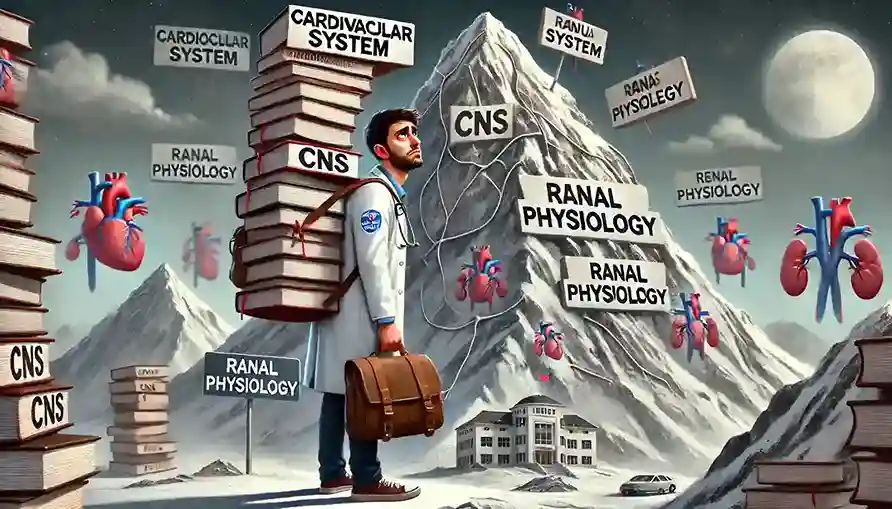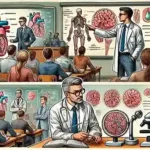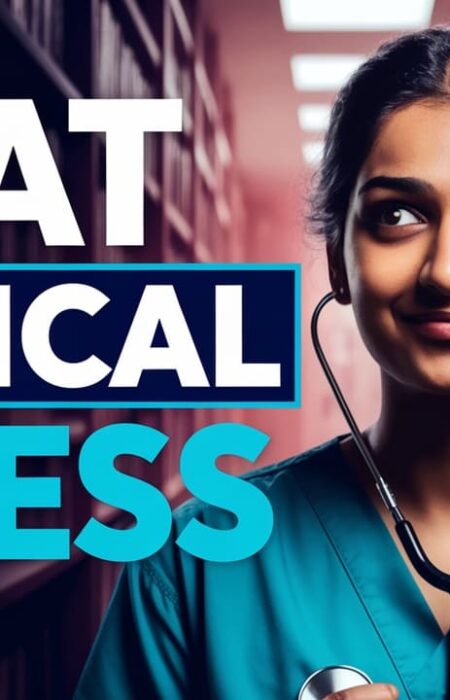How to Study Physiology in First Year MBBS: A Practical Guide
If you’re in your first year of MBBS, you’ve probably realized by now that physiology isn’t just another subject—it’s the foundation of understanding how the human body works. From nerve impulses to cardiac cycles and renal systems, physiology explains the why and how behind everything.
It is an extremely important subject as it creates the foundation for your Pathology, Microbiology and Medicine and Allied Subjects.
And honestly, Physiology is the most interesting of all the 3 first year subjects. Anatomy is a lot about memorising and visualisation of the body parts and Biochemistry is about rote learning and it’s application in clinical cases. Physiology, on the other hand, is very conceptual. You can write a lot based on your own after understanding the topics conceptually, instead of just rote learning.
But with so many diagrams, mechanisms, and organ systems, it can feel like a mountain.
It becomes quite a steep climb, especially when Neurophysiology and Cardiac Physiology slide in. But worry not, Physiology was my favourite subject in first year. And I am here to help you out.
Let’s start with understanding what ‘Human Physiology’ is-
What is Human Physiology?
Physiology is the study of the body’s processes to keep the body in a homeostatic state.
Physiology isn’t about memorizing random facts—it’s about understanding processes, mechanisms and their interconnections. It is quite fundamental- just like physics was. There are a lot of conceptual topics that you need to understand and learn. And, don’t be surprised if I tell you that you will be applying some physics formulas also.
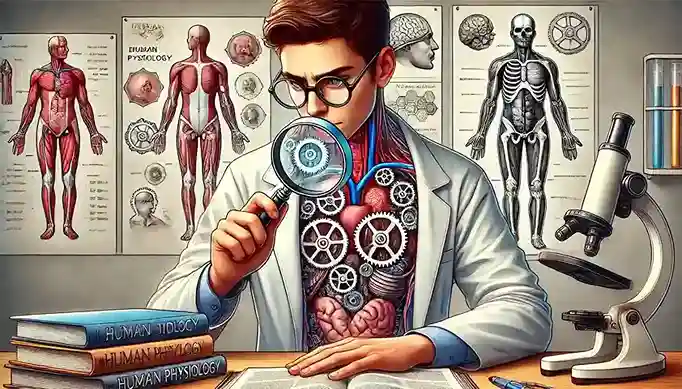
Let us start with the contents-
- The Cell and General Physiology- Easy. A Lot of the topics you have read during your NEET preparation.
- Blood- Not a lot of concepts to be understood. However, a lot of facts to be learned. Relatively Easy.
- Immunity– A Lot of facts to be learned. Not that easy. Newer topics will be introduced. Can be a little overwhelming. If you study this properly in first year, it will help you in pathology and microbiology in 2nd year. Immunology is a big section part of Microbiology in 2nd year.
- Digestion and Absorption- Relatively easy. A lot of the base for this organ system has been done during your NEET preparation. But you will be learning a lot of stuff on top of that.
- Excretory System- Difficult. It has new topics that you will be learning. This can be only understood properly only if you have learned the Nerve and Musculoskeletal System properly. The transport across the glomerulus and nephron is very important and difficult. Has to be done properly. The RAAS system also has to be mastered.
- Temperature Regulation- Small system and relatively easy.
- Respiratory System- Some newer concepts that you have to learn will be difficult- Like Ventilation / Perfusion Ratio, etc. They are quite conceptual so make good efforts to understand them. Najeeb and Ninja Nerd are the way to go for these topics.
- Special Senses- Very difficult and overwhelming for a first year student. Eye and Ear are obnoxiously complex and have to be done well so that 3rd year ENT and Ophthalmology does not feel overwhelming.
- Endocrinology- Just as Digestion and Absorption, Relatively easy. A lot of the base for this organ system has been done during your NEET preparation. However, you will be adding newer topics on top of that base.
- Reproduction– Small and easy. Very similar to what you have read during NEET preparation.
- Nerve and Muscle- Very fundamental and will create the basis for 3 most difficult organ systems- Renal, Central Nervous system and Cardiovascular system. Will be taught early on in the first year. Pay attention to it. Use Ninja Nerd for help.
- Cardiovascular System- Very Important. I cannot say it enough. And a lot of concepts which are very fundamental and conceptual. They have to be understood. Don’t just mug them up. Difficult and very important.
- Central Nervous system- A nightmare of an organ system. It has a lot of newer topics. And a lot of them are very difficult. Give this system a lot of time. Especially the nerve tracts. Take help from Ninja Nerd and Najeeb. Probably the toughest organ system in physiology.
Pro Tip: Watch YouTube videos to understand the topic before reading it from a book. It will make your reading 100x faster and will reinforce your learning. Make notes for all the important topics. It will make revision for when you have to prepare for your exams.
Choose the Right Books (Don’t Drown in Them!)
Physiology books are overwhelming. I’d suggest sticking to one primary textbook and using others for reference. I’ve listed down all the books and their utility here-
Guyton and Hall
Guyton is a detailed and concept-rich book, but it’s not the easiest to retain, especially for university exams. The conversational style makes it feel like the author is talking to you. This can get tricky unless you’re actively making notes.
I’d recommend using Guyton selectively. Stick to it for short conceptual topics like Cardiovascular, Neuromuscular and Skeletal Systems. But for huge, complex systems like the CNS, Indian author books are often more straightforward and exam-friendly.
If you’re someone who prefers videos, prioritize those first. And then, use Guyton as a reference to clarify concepts that remain unclear from lectures or YouTube videos.
Bottom line: Guyton is unbeatable for concepts but not ideal for exams. If you can read it entirely in first year itself, well and good. If not, that’s fine too.
Costanzo Physiology
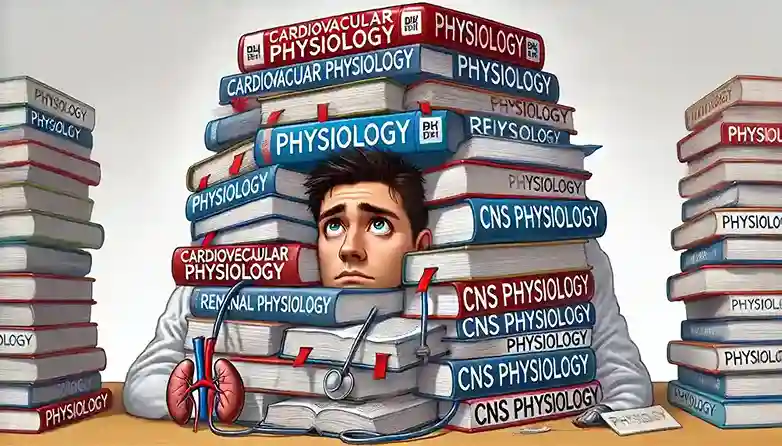
Costanzo is a much better book is widely preferred by USMLE students. It’s written in a concise, point-wise format, making it far easier to read and retain compared to Guyton. While it covers all the concepts of Guyton, it presents them in a more point-wise and digestible manner.
If you truly want to invest time in a foreign author and but find it difficult to read Guyton then, Costanzo > Guyton.
Ganong
I am not a big endorser of Ganong. It’s a supplemental resource, not something you should use as your primary book. Sure, Ganong adds value to a few organ systems, but focusing too much might be a grave mistake.
Realistically, you need to balance all three subjects in first year. MBBS is never just about mastering just one subject. If you stick to Costanzo and practice some USMLE-style questions, your concepts will already be great.
The key is to study smart, not just hard. Remember, everybody has different capabilities and just because one student can do the tough work, does not mean all of us can do it.
Indu Khurana
This book is so underrated, yet so good. It is all in one: simple, easy-to-read, and highly exam-oriented while still covering all the important stuff. The content is presented in flowcharts, tables, and pointers, this makes it easy to retain and revise.

If foreign author books aren’t working for you, you can confidently use this as your primary book. It’s got everything you need to pass exams and be at par with peers reading standard international books. In fact, in some sections, it contains more information than foreign texts.
A must-read and highly underrated resource that genuinely deserves far more recognition!
A.K. Jain
This is the go-to book for many first-year students, and for good reason. It’s good enough to pass your exams without much trouble. However, while reading, I noticed that some organ systems, like the CNS, lack the depth and detail needed to write good answers in exams.
This inconsistency isn’t an issue with Indu Khurana, which maintains uniform detail across all systems. If you’re looking for a more balanced and thorough approach, keep that in mind.
JJ notes
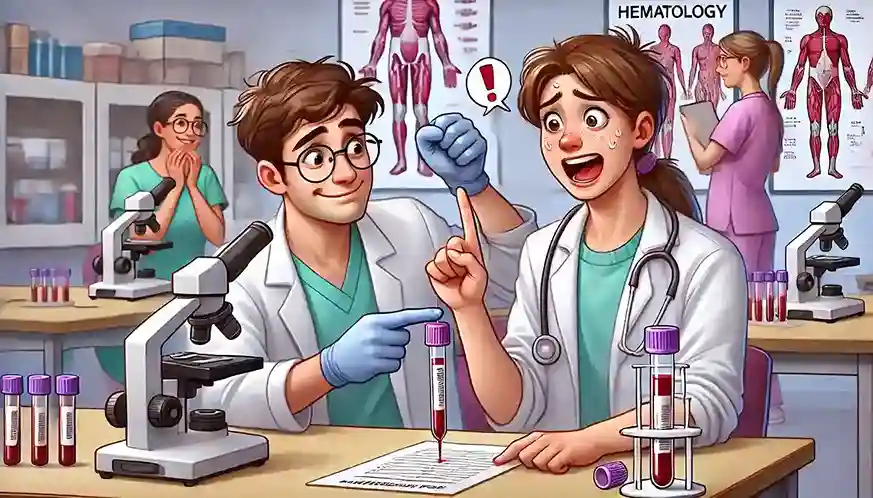
These notes, created by some Grant Medical College seniors, are a lifesaver for university exams. They’re concise and focus mainly on commonly asked questions and answers.
This should be your last resort, not your primary source for studying. Use them when you’re short on time or need a quick revision before exams. If you go through JJ notes, you won’t understand a lot but will surely pass your exams.
Book Strategy:
If an Indian Author is Your Primary Book
- Watch videos from your preferred source (YouTube/classes) and make notes.
- Read the Indian author book thoroughly to ensure your theory knowledge and facts are clear.
- For your satisfaction, cross-check with a foreign author book (like Costanzo or Guyton) to ensure you’ve covered everything. If a concept is explained better in the foreign author’s book, you can read it quickly for clarity.
If a Foreign Author is your Primary Book
- Again, Start with videos to grasp the basics.
- Use Costanzo as your primary choice (Costanzo > Guyton) and make notes that fit with your university exam patterns.
- Alternatively, for exams, you can go through an Indian author for quick revision. But stick to one primary book for your university preparation, whether it’s Indian or foreign.
Where to watch videos?

Sometimes, reading alone isn’t enough. Videos and online tools can help you grasp difficult concepts.
Do you need a paid subscription for physiology? Absolutely not. There are many free resources on YouTube.
Free Physiology Resources Online:
- Ninja Nerd Science: detailed explanations, the perfect guy for physiology. He makes diagrams on a white board while teaching. You won’t regret watching his videos.
- Dr. Najeeb Lectures: The perfect person to offer conceptual clarity in physiology. You can buy his subscription plan if you wish to. The only downside is that his videos are quite time consuming. The key is to make notes from his lectures and then revise. Watch him only if you have enough time.
- Edu Club– Very underrated Youtube channel. He teaches all the concepts from foreign author books in a very small and detailed video. MUST WATCH. Better than most Indian Coaching physiology videos as each video is just 8-10 minutes but very detailed.
- Osmosis– There are a lot of free videos available on Youtube. If you like them, you can buy the subscription as well. Small colourful animated videos for each concept.
Focus on Diagrams and Flowcharts for extra marks in exam.
Physiology is all about processes—how a nerve conducts signals, how kidneys filter blood, or how the heart pumps. You’ll need diagrams and flowcharts to simplify complex mechanisms.
- Draw diagrams repeatedly until you can reproduce them from memory. Practice processes in forms of diagrams. Like for learning cardiac cycle, use a “box” heart diagram and then start writing the steps of the cardiac cycle in it. You will retain it much better.
- Convert mechanisms into flowcharts. For example:
- RAAS System: Drop in BP → Renin release → Angiotensin I → Angiotensin II → Aldosterone secretion → BP increases.
- Make flowcharts for all your CNS nerve tracts.
- Different flowcharts for different kinds of shock.
- Cardiac cycle.
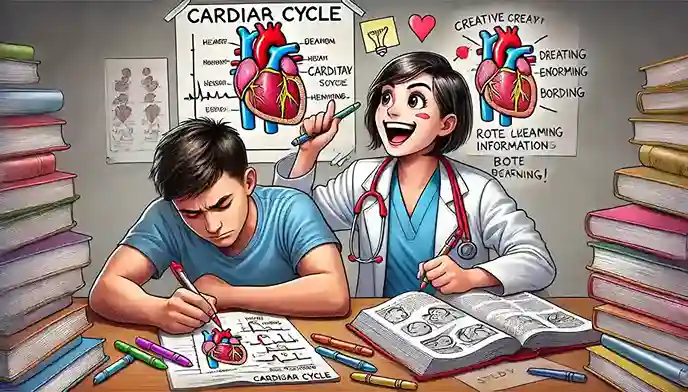
ANY physiological process can be made into a flowchart. It will help you remember the steps better.
Pro Tip: Diagrams and flowcharts get you more marks than just writing the theory. If you are not getting enough marks even though you have read everything, work on your paper presentation. Examiners love flow charts and diagrams. THEY LOVE IT!!!!!
Understand and Write Mechanisms Step by Step
Each physiological process has steps. The trick is to understand one step at a time.
- Break the process down into simple steps.
Example:
For nerve conduction:
- Resting membrane potential (polarization).
- Depolarization (Na+ channels open).
- Repolarization (K+ channels open).
- Hyperpolarization and return to resting potential.
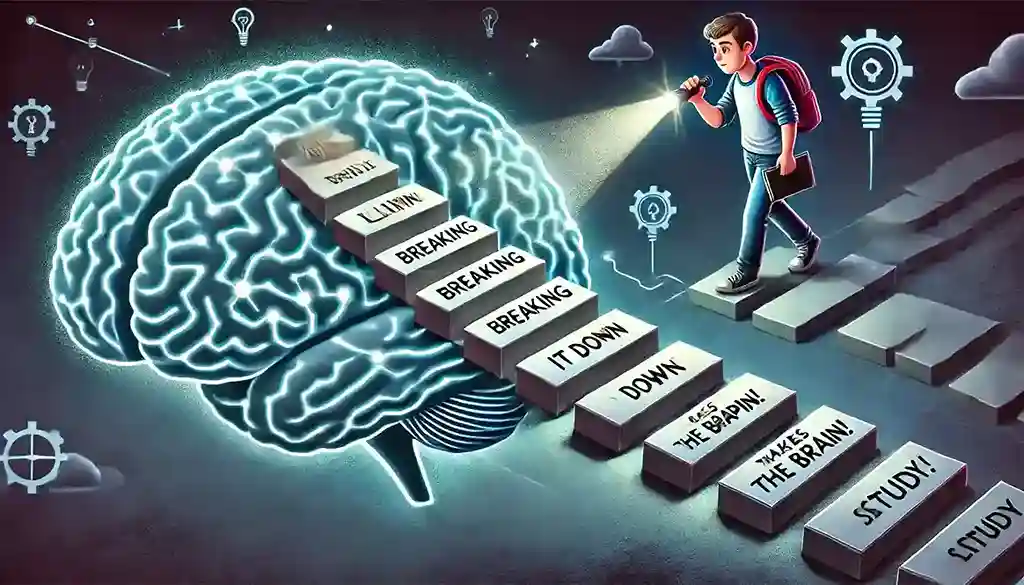
Step-by-step processes make it less intimidating.
Pro tip: Always write your paper in “steps” or “points”. Examiners hate reading papers which are written in the form of an essay. Consider their point of view. They have to check close to 200 exam sheets. They do not have the time to read each and every line of the paper. WRITE IN STEPS, GET MORE MARKS.
University Theory Exams: High Yield Topics
There is a questions list called ‘Bhalani’ available for exams. You can get it from your seniors. It is a compilation of all the famous and repeated questions over the years in MBBS University exams. Focusing on Bhalani for exam will help you get more marks.

Some of the Bhalani topics are:
- Cardiovascular Physiology: Cardiac cycle, ECG, blood pressure regulation.
- Respiratory Physiology: Mechanics of breathing, gas exchange.
- Nervous System: Nerve conduction, reflexes, nerve tracts.
- Renal Physiology: GFR, RAAS, urine formation.
- Endocrinology: Hormone actions, feedback loops.
Practical Exams: Relate Concepts to Clinical Cases
I am just giving you an overview of the practical aspect of Physiology in this blog. We will be writing another detailed blog to outline the steps of physiology practical exam and tips to ace them.
You have to perform several tasks in the practical exam:
- Haematology: Be ready to pierce your finger to prepare slides.
- Clinical Examinations: CVS, Respiratory System, Nervous System, GIT, Special Senses.
- Spotters: These are image based questions that are usually taken from your physiology journals. They include amphibian experiments, case based diagnoses, etc.
- Human Physiology Experiments: You will have to perform one of the following: Perimetry, ECG, Spirometry, Howard Step Test, etc
- Viva
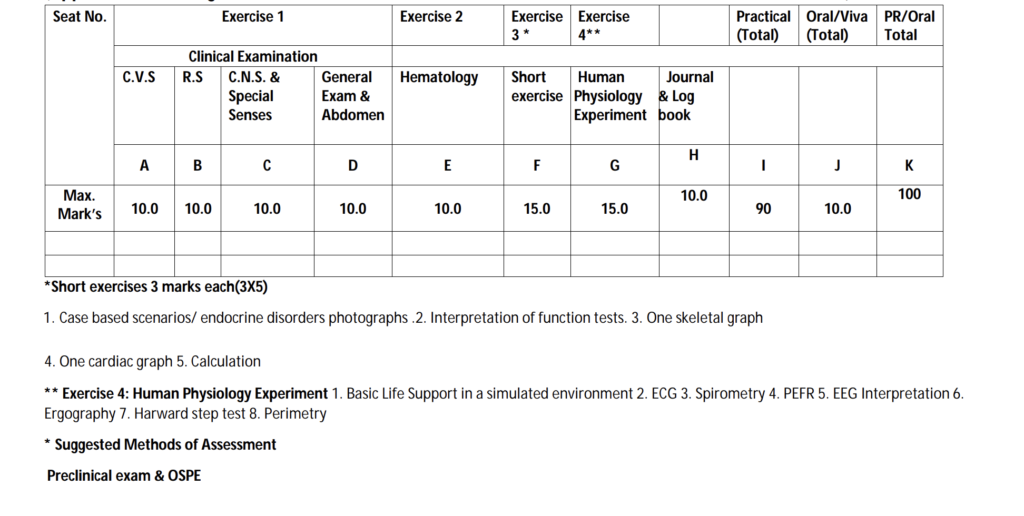
Worry not, I will be writing another blog on how to ace your practical exams.
You’ve Got This!
As I said, physiology is not an isolated subject – it’s the key to understanding pathology and medicine. But, with the right books, a good strategy in place, and regular revision, you’ll ace physiology. Physiology if done right can make your clinical years very easy.
Take it one step at a time, enjoy the process, and remember: consistency > perfection. Reading a few topics every day for 2-3 hours is much better than binging videos and learning them at the last moment.
Happy studying and good luck! 🩺✨
